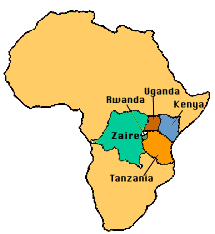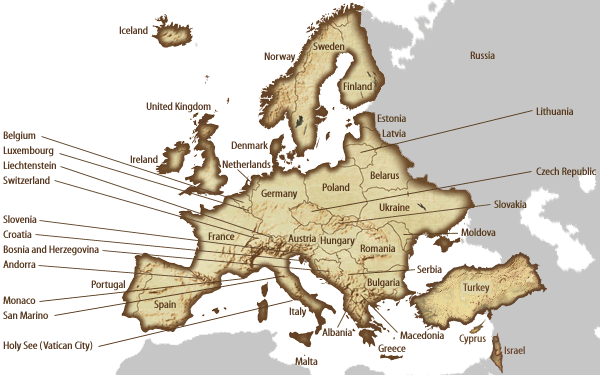African-Asians Worldwide (USA, Canada, NZ, South Africa)
![]()
|
|
 |
Most of the Asians in Uganda, East Africa came in the 1920's from various parts of India (Kutch, Gujarat) but many were already immigrants to India having stayed there and intermarried. This groups who had settled in India (and Pakistan) for many generations is thought to have arrived from ancient Turkey and Persia.
In the past, well before the Colonizing Europeans arrived, there already existed a strong Trade and Cultural link between the Middle-East, India and Africa. Some of the people traveled to Uganda as traders others went there to work for the British government. Similar, immigration also occurred to other places in Africa, mainly Kenya, Tanzania, Malawi, Zambia and South Africa.

The first generation in Uganda were real pioneers in that they cleared forests, built houses and small settlements and farms. Many opened small shops, and helped to build the infrastructure for a modern Uganda. They did their best to educate their children, opening small private schools where there were no Government or missionary schools, paying for teachers and upkeep by raising funds within their small communities. This second generation of Ugandans (born and educated in Uganda) went on to work at all levels within the Ugandan infrastructure, becoming teachers, policeman, doctors and businessman. Their children now growing up in the 60's, knew Uganda as an Independent and Democratic country with a great deal of potential, where the was a great sense of positive optimism and where hard work and endurance would always be rewarded. Unfortunately, the military coup, inspired by the British to dispose the elected president Milton Obote, brought a typical Third World affliction with it, a power hungry, inexperienced, uneducated and uncultured despot, General Idi Amin to power.
The Asian community did not suspect that this man would in a few years, force them out of Uganda. However, the signs were in the air. There were always road blocks on the main roads, manned by opportunistic and undisciplined soldiers looking for easy pickings from travelers. There were rumors of the military killing people and dumping bodies in the lakes and rivers for the crocodiles to digest away the evidence of their crimes. The wealthy people started to look for alternatives, a minor few of these left or sent their families to Britain well before the 90 day ultimatum. Idi Amins madness soon caught up with the Asian community even though they were no threat to him or his military and political power-base. The Asian community in Uganda was extremely law-abiding, interested in everyday life's problems and remained largely out of politics (maybe this was their mistake). Following the threat (leave the country in 90 days or else) there was a great deal of apprehension on the part of the heads of families to find a way to safeguard their families. Most made their perilous way to Kampala and queued at the British Embassy for days in the hope of getting British subject or British national status and therefore a way out of Uganda. However, a many whose grandparents never had passports and were born in Uganda (not ever imagining the existence of such a document even) found themselves stateless. This group, was the most desperate with the largest percentage of poor people, most of whom could not afford a jet-liner tickets were given an escape route by the United Nations, which arranged for lists from various host-countries and charter flights to them, towards the end of the 90-day deadline.

Thus in 1972 most people ended in UK, but many of the stateless persons were taken to Italy, Denmark and other countries from where they eventually settled in USA, Netherlands, Sweden, Denmark, New Zealand and Canada.
In UK the plane loads of families arriving in the VC10 of East African Airways or 737's of Egypt Air and other airlines were completely exhausted. This was because the plane trip was just the final part of a long and difficult journey which started many days before e.g. leaving the town of Jinja to Kampala by car with all the belongings along roads manned by soldiers looking for ways to steal and harass the 'Muindi'. On arriving in Kampala most stayed with relatives or friends until the day of the flight and than they had to make the trip to the airport, Entebbe, with all its associated risks.
UK
On arrival in UK, there were volunteers with coffee and apples for the new arrivals who were than taken by coaches to Army and Air force camps e.g. West Malling, where they were assigned rooms. The next day, meals and other basic necessities e.g. warm clothes, shoes were provide by volunteers, many from the Army and Air force.
Most people found jobs and accommodation with help from job centers and local councils within the first few months. The children were give places in local schools and many locals welcomed the new arrivals in towns like Walton-on Thames, Havant and others throughout UK. Some donated furniture and cutlery to ease the new comers
situation who had to start life from scratch.
The adaptation to life in the UK by the newcomers was most difficult by the older generation. The main problems were the climate, the lack of sunlight and cold, but the cultural problems were just as difficult. many did not speak English, did not like the English food or the formal and lonely lifestyle in UK. They tried to adapt and one way was to congregate together and many after the first 5 to 10 years moved to areas where there were others e.g. West London, Manchester, Leicester, Birmingham and Blackburn.
In the next 10 years (1980's) they made big efforts to restart their previous or new businesses, many thought about returning to Uganda but they like their parents in Uganda had dedicated most of their energy on the education of their children. Many of them married amongst the Ugandan community but some married locally or from India and Pakistan.
In the 1990's the new generation born in the UK began growing up, but with this the old links and bonds were growing weaker. The bonds were being maintained mainly by the generation born in Uganda, the British generation grew up with a different attitude and lifestyle. However, the fact that many of the older generations were now passing away and the growth of wealth and competition among their previous generation and lack of direction did not help. This new generation was more concerned with the size and location of their house, the model of car they drove and how much and type of electrical goods they had in their name. And yet they were not happy and always strived and worked harder for acquiring more and more at the expense of the social bonds and keeping in touch with the community. A large part of this behaviour was related to the normal environment and social and cultural values in UK but a part to the individual weakness and need to conform. Of course a part of this is related to the pioneering spirit of our grandparents.
I hope that the next generation will maintain a link with their past.
If you would like to make a comment or add your views from any country please send an e-mail .
Further information:
Establishment in Uganda see www.asiansfromuganda.org
![]()
![]() Back
to expatriates Page
Back
to expatriates Page
![]() Back to top
Back to top